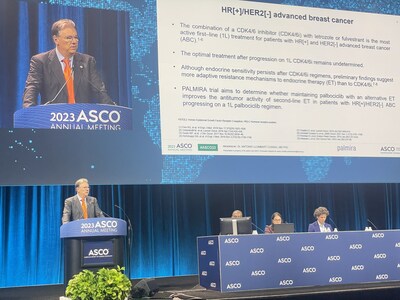MEDSIR Study Finds No Progression-Free Survival Benefit with Palbociclib Maintenance After First-Line Regimen in HR+/HER2- Advanced Breast Cancer Patients
PR Newswire
JERSEY CITY, N.J., June 9, 2023
JERSEY CITY, N.J., June 9, 2023 /PRNewswire/ -- MEDSIR announced today the results of the PALMIRA trial. This randomized phase 2 study evaluated the safety and efficacy of palbociclib maintenance in combination with second-line endocrine therapy in patients with hormone receptor-positive/HER2-negative (HR+/HER2-) advanced breast cancer who had showed a confirmed progressive disease on first-linepalbociclib plus endocrine therapy-based treatment after having achieved clinical benefit to this regimen. The results of this trial demonstrate that palbociclib maintenance does not significantly improve progression-free survival, the primary endpoint of the study, compared with second-line endocrine therapy alone in this patient population.
The PALMIRA study is sponsored by MEDSIR, a company dedicated to advancing clinical research in oncology, and was led by Dr. Antonio Llombart-Cussac along with Dr. Javier Cortés and Dr. José Pérez as Scientific Coordinators. The trial involved 198 patients with HR+/HER2- advanced breast cancer from 41 centers in 6 European countries.
Endocrine therapy is the mainstay of treatment for patients with HR+/HER2- advanced breast cancer. Several studies have demonstrated that the addition of cyclin-dependent kinases 4 and 6 (CDK4/6) to first- and second-line endocrine therapy leads to an improved progression-free survival and overall survival. However, the optimal treatment after progression on a CDK4/6 inhibitor in patients with HR+/HER2- advanced breast cancer remains undetermined.
One of the therapeutic options that have been evaluated in this scenario is the maintenance of CDK4/6 inhibition beyond progression switching the endocrine therapy and maintaining or shifting the CDK4/6 inhibitor or continuing the same endocrine therapy and changing to a different CDK4/6 inhibitor. Some of these studies had already suggested a continued benefit from this clinical approach but they must be interpreted with caution due to potential biases, mainly the use of a different CDK4/6 inhibitor.
The PALMIRA study aimed to determine if palbociclib maintenance could improve the antitumor activity of second-line endocrine therapy in HR+/HER2- advanced breast cancer patients who had showed a confirmed progressive disease on first-linepalbociclib plus endocrine therapy-based treatment after having achieved clinical benefit to this regimen.
"Results of the PALMIRA trial, while negative, will guide further research on the optimal treatment upon progression to CDK4/6 inhibitors and our clinical practice," said Dr. Llombart-Cussac, principal investigator of the study and Head of Service at Arnau de Vilanova Hospital in Valencia, Spain. Findings from the PALMIRA study indicate that "re-treatment with the same CDK4/6 inhibitor and switching the endocrine therapy does not improve patient outcomes."
Dr. Cortés, director of the International Breast Cancer Center, stated, "based on the results of the PALMIRA study, we suspect that there is a subgroup of patients that could benefit from maintaining palbociclib after prior progression on a palbociclib-based regimen. Biomarkers are the way to identify these patients and optimize the best future treatment options for them."
The results of the primary endpoint, progression-free survival, have been presented as an oral presentation at the 2023 American Society of Clinical Oncology (ASCO) Annual Meeting.
Media Contact:
Carlos Mateos
+34 685536816
360465@email4pr.com
![]() View original content to download multimedia:https://www.prnewswire.com/news-releases/medsir-study-finds-no-progression-free-survival-benefit-with-palbociclib-maintenance-after-first-line-regimen-in-hrher2--advanced-breast-cancer-patients-301847256.html
View original content to download multimedia:https://www.prnewswire.com/news-releases/medsir-study-finds-no-progression-free-survival-benefit-with-palbociclib-maintenance-after-first-line-regimen-in-hrher2--advanced-breast-cancer-patients-301847256.html
SOURCE MEDSIR



